Let’s talk about how to help someone who is grieving.
Someone you know has lost a loved one. It might be a spouse, a parent, a child, or a close friend or relative. How can you support them in real, tangible ways during this time of mourning?
This sort of loss is devastating, and you want to be there for your friend. And you want to go beyond sending flowers and lame offers (that they’ll never take you up on) of “How can I help?” or “Let me know if you need anything.”
Here are 22 simple – yet meaningful and effective – tips on caring for someone who is grieving.
22 Tips on How to Help Someone Who Is Grieving
Want the complete list of how to help someone who is grieving without having to read so much? Click here.
1. Everyone does not grieve the same way.
You may have experienced a loss, or maybe you were around a grieving family member after they lost their parent, spouse, or child. Or maybe you’ve read a lot on the subject by reading books, articles, and blog posts like this one.
But don’t be surprised if your grieving friend or family member experiences their loss in a way that is different than you expect.
Everyone processes things in their own way and in their own time.
(Did you know that there are 16 different types of grief? Yeah, for real.)
So first of all, be aware that all these tips and guidelines are just that, and not hard-and-fast rules. Expect the unexpected, allow the mourner space to breathe and the freedom to react, and this in itself will be a great way to care for someone who is grieving.
What to do: Spend some time thinking about your friend, their personality, their needs, their relationship with the deceased. This is the necessary background work to effectively help and support them.
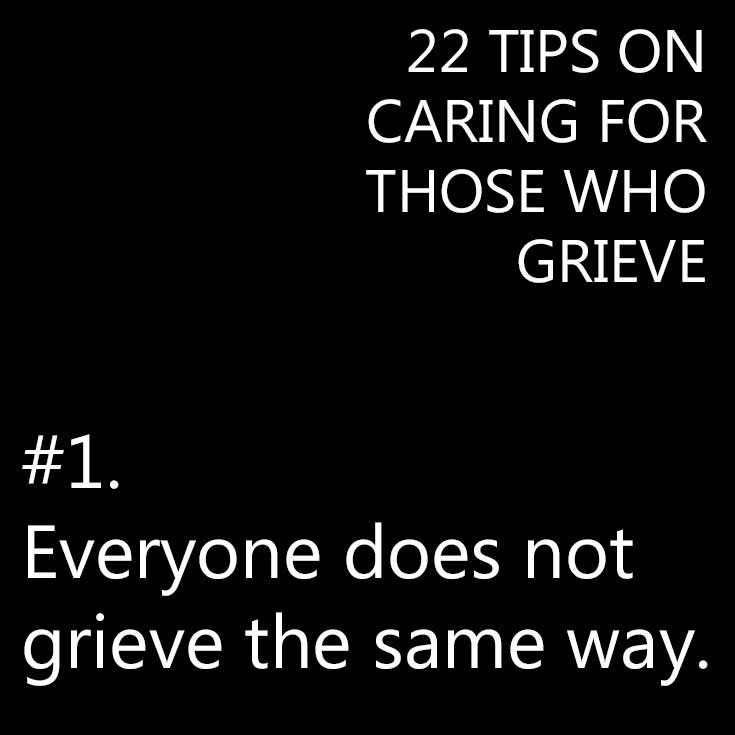
2. Be there.
It’s so simple, but so necessary. We need one another. Do you really want to know how to help someone who is grieving? Just be there; in silence, to listen, to sit a watch a movie together, to be present so they feel free to take a nap.
Some people will want to be alone in their grief, and many times that’s perfectly ok. But even if they do want space to process things on their own, they will appreciate your efforts to be there for them.
What to do: Offer your presence, and do what it takes to make it happen (or accept that they need to just be alone). Take time off work, bring a book to read, be ready to jump in and do the dishes or some laundry.
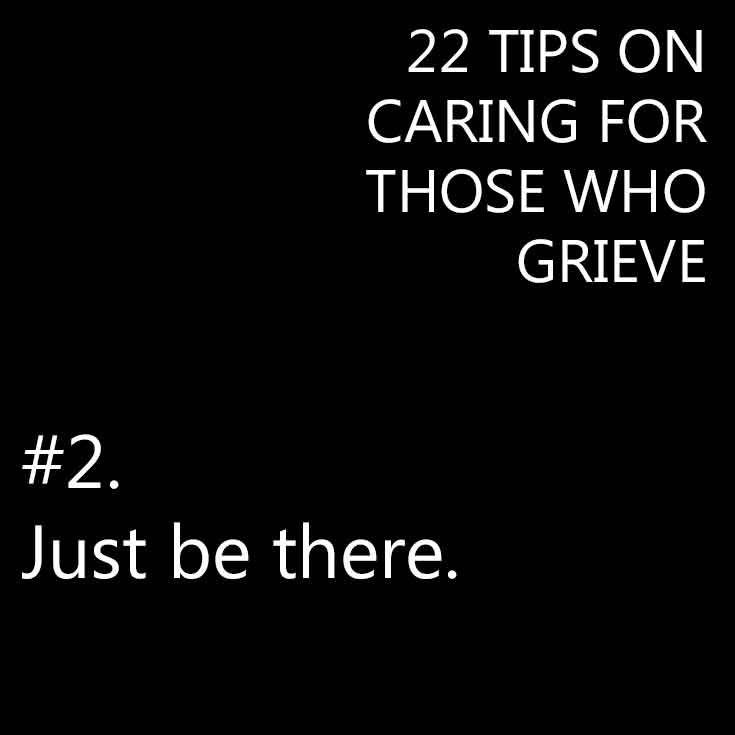
3. Be silent together.
Don’t fear silence. The grieving person will often be lost in thought or simply not want to talk. That’s ok. Give them time, and allow for silence.
Don’t fall prey to the temptation to to fill the quiet with platitudes – no one needs that. Your presence and your understanding silence will be enough.
What to do: Prepare yourself for quiet. Try to shut down your desire to speak up and solve everything.
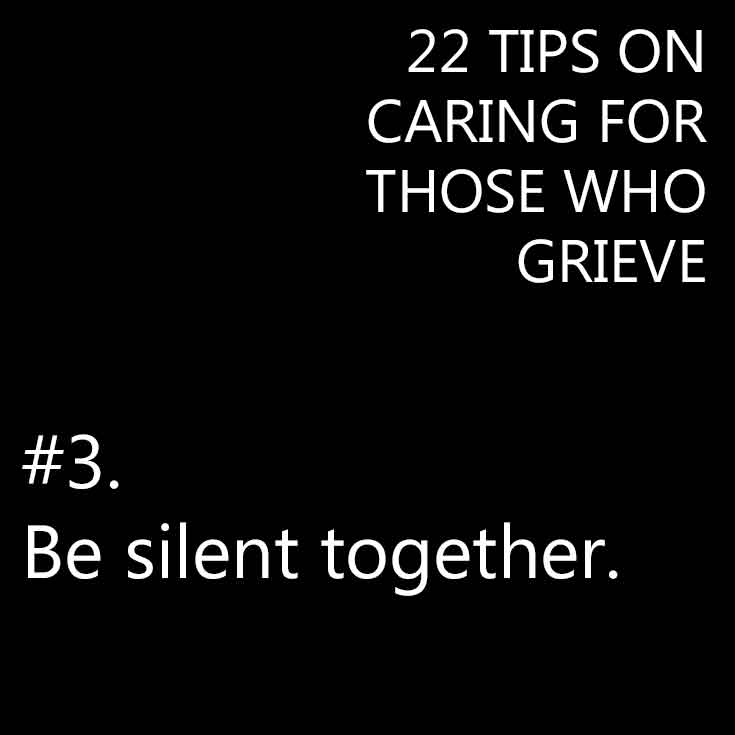
4. Be specific when offering help.
No one ever likes to ask for things, least of all the grieving spouse or parent. They already feel like a burden, so if you ask “Do you need help with anything?” they will almost always say no.
Instead, try, “I’d like to bring a meal, do you have any preferences? What day would work best?”
Here are a few samples of how to offer help:
- May I take your kids to the park for a couple hours?
- Can I do your laundry on Thursday?
- May I mow your lawn?
- I’m going to the grocery store tomorrow, can I pick you up anything you’re out of?
- Can I pick up your dry cleaning?
- I’d love to walk your dog for you!
What to do: Think about 3-4 specific things they might need help with, and offer to do them (one at a time!).
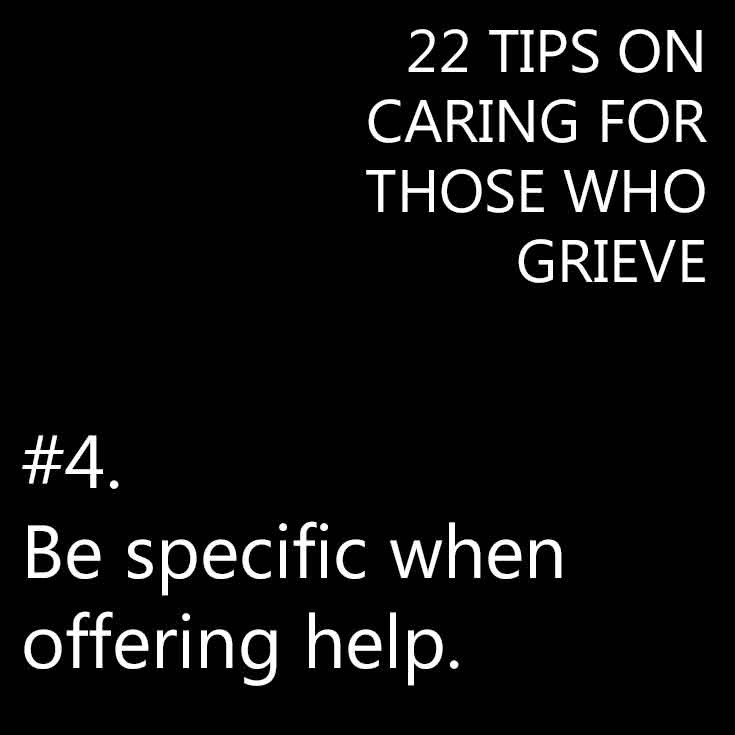
5. Take initiative in practical things.
This tip is along the same lines as the previous one. Specifically, be aware that someone who is grieving will rarely want to take initiative and get the ball rolling on things, whether it’s exercise, errands, or activities.
You can care for them by helping spur them on:
- Shop for groceries or run errands
- Drop off a casserole or other type of food
- Help with funeral arrangements
- Stay in his or her home to take phone calls and receive guests
- Help with insurance forms, bills, or other paperwork
- Take care of housework, such as cleaning or laundry
- Watch his or her children or pick them up from school
- Drive him or her wherever he or she needs to go
- Look after his or her pets
- Go with them to a support group meeting
- Accompany them on a walk
- Take them to lunch or a movie
- Share an enjoyable activity (game, puzzle, art project)
What to do: Be present (see tip #2) and you’ll be all the more aware of what ways you can jump in and help your grieving friend.
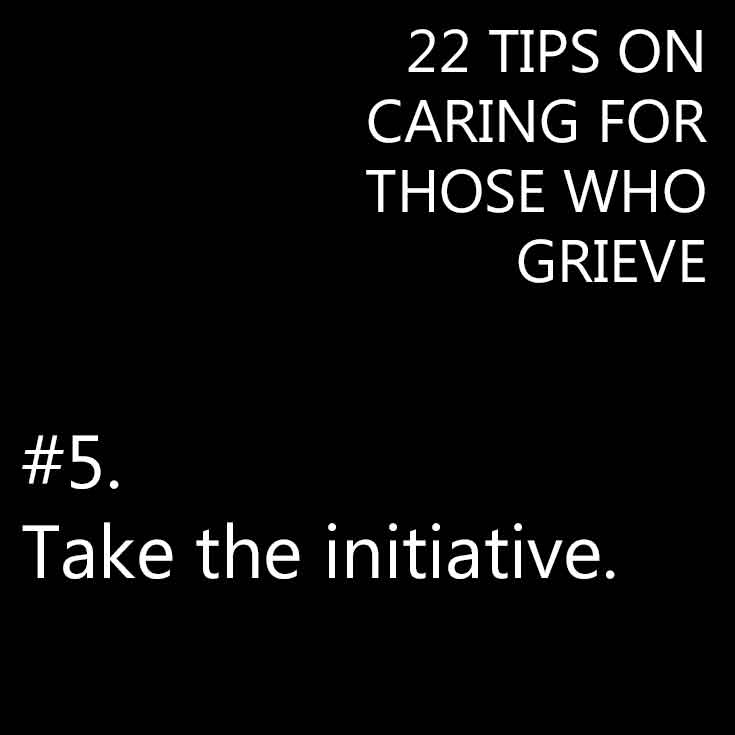
6. Bring food.
Bring healthy food, comfort food, freezer/crockpot food for later, pantry food, hot meals.
For tips, ideas, recipes, and more, check out our handy resource, The Complete Guide to Sympathy Meals.
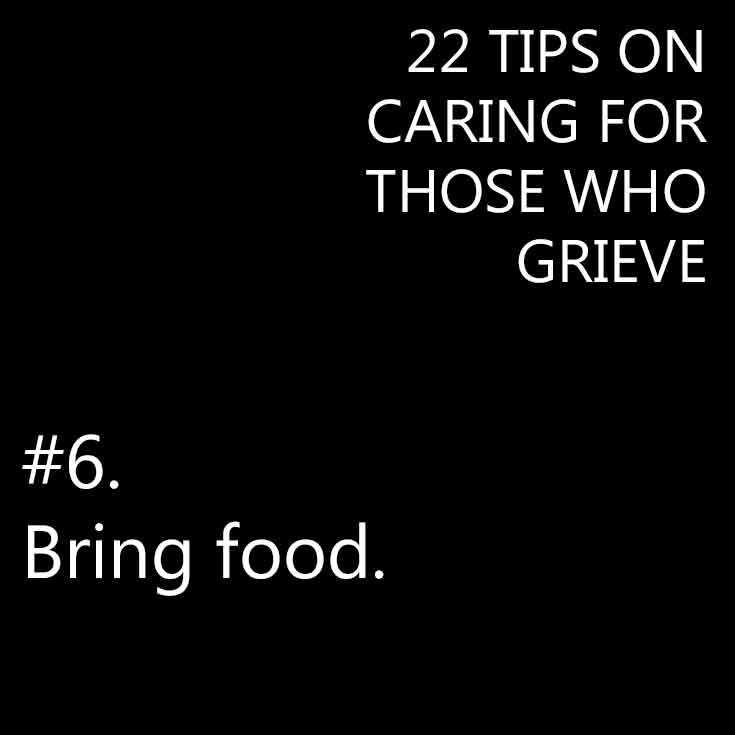
7. Use Bible verses with care.
While comforting Scripture verses can be helpful to grieving Christians at the right time, it’s really not a good idea to tell someone who has just lost a loved one that “what we suffer now is nothing compared to the glory He will reveal to us later” (Romans 8:18), or that “for those who love God, all things work together for good” (Romans 8:28).
Those are valuable and precious truths, and are a source of comfort for many Christians in times of trial, but quoting those are not really the best way to help someone who is grieving.
Wisdom dictates that there is a time to mourn (Ecclesiastes 3:4), and Jesus himself said that there is a sense in which grief is appropriate and even a source of blessing (Matthew 5:4). So take care that you do not minimize the grief which the mourner is currently experiencing.
Often the Romans-8:28-type verses are used as a way to imply that the grieving person should get over it, not take things so hard, not cry so much, etc. For a Christian who has experienced a loss, there are many other verses in Scripture which will better identify with where they are at emotionally.
What to do: Talk to a pastor and ask their advice; when with your grieving friend, be ready to say “I don’t know.” Meditate on the Psalms; many of those passages resonate with those who grieve.
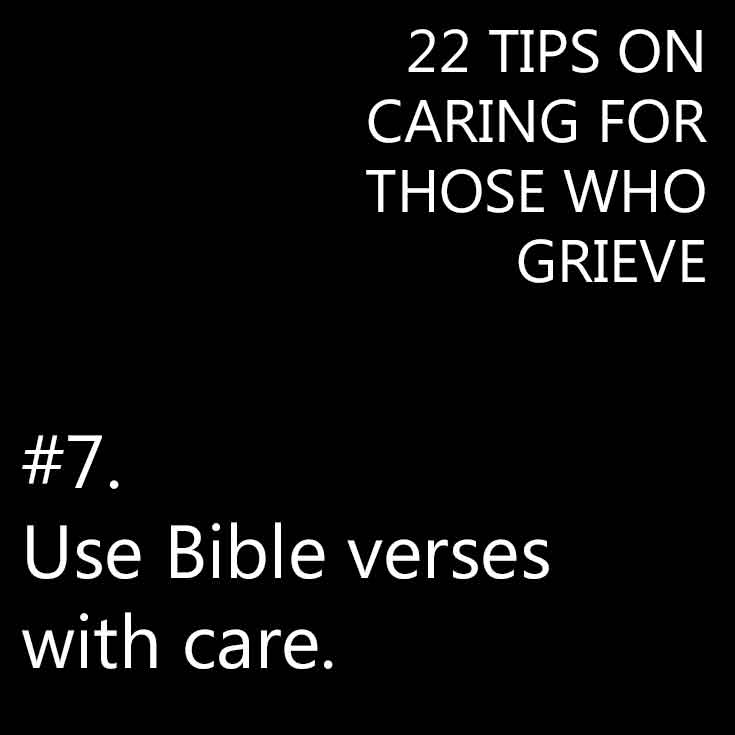
Dig Deeper: What are some good Bible verses about mourning the loss of a loved one?
Here are some comforting Scripture verses for the loss of a loved one:
- Be gracious to me, O LORD, for I am in distress; my eye is wasted from grief; my soul and my body also. (Psalm 31:9)
- When you pass through the waters, I will be with you; and through the rivers, they shall not overwhelm you. (Isaiah 43:2)
- Lead me to the Rock that is higher than I. (Psalm 61:2)
- My tears have been my food day and night, while they say to me all the day long, “Where is your God?” (Psalm 42:3)
- You have kept count of my tossings; put my tears in your bottle. Are they not in your book? (Psalm 56:8)
- I am weary with my moaning; every night I flood my bed with tears; I drench my couch with my weeping. (Psalm 6:6)
These verses can be helpful to encourage the mourner that they are not alone – the authors of Scripture, such as David, have experienced grief, and God’s word does not regard it as a strange thing or something you should just “get over.”
There are also Bible passages which provide encouraging promises which Christians hold on to in hope of what is to come. In the midst of grief, it’s not always recommended that you share the verses which promise joy, satisfaction, etc.
But here are a few which, used wisely, can be a source of consolation in the midst of grief:
- Behold, I am making all things new. (Revelation 21:5)
- The steadfast love of the Lord never ceases; his mercies never come to an end. (Lamentations 3:22)
- I am the resurrection and the life. Whoever believes in me, though he die, yet shall he live. (John 11:25)
- Behold, I am with you always. (Matthew 28:20)
- Blessed are those who mourn, for they shall be comforted. (Matthew 5:4)
Here are a few more verses and helpful comments from someone who has gone through grief and shared what gave her comfort during the darkest times.

8. Don’t be offended.
As noted above, everyone does not grieve the same way.
Be there for them, even when they say or do something that might seem offensive or hurtful. They just lost someone; are you going to leave them too? Just… don’t. Don’t get offended and leave.
Of course, if they really don’t want you there, by all means, do leave! You want to respect their wishes. But don’t stop caring for them because they said something you didn’t like or because they didn’t appreciate your overtures of kindness. Get over yourself and just be there for them.
What to do: Mentally prepare yourself to be offended or under-appreciated. Remember, it’s not about you and how great you are for being willing to help out.
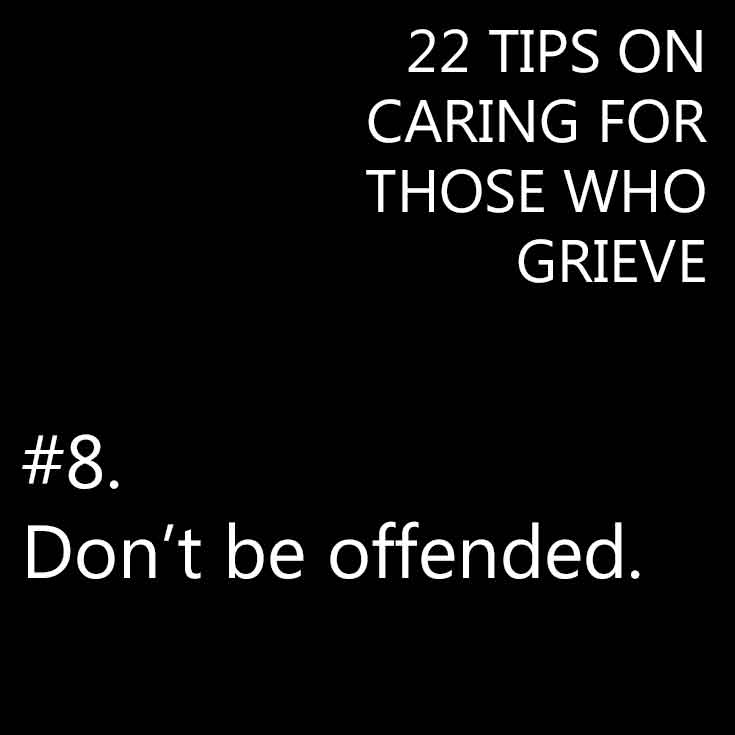
9. Invite them to things.
Invite them to lunch, coffee, a day trip to the park, a movie, church, the beach, shopping, etc. Let them know it’s perfectly ok to say no, and then keep the invitations coming.
Someone who is grieving probably won’t want to do much initially, but thoughtful invitations will show that you care, and the caveat that you’re fine with them declining will go a long way.
When they’re ready to start doing things again, they will appreciate all your effort.
What to do: Invite them to things, but avoid big gatherings at first. Or offer to be their shield for bigger events, like church or when shopping.
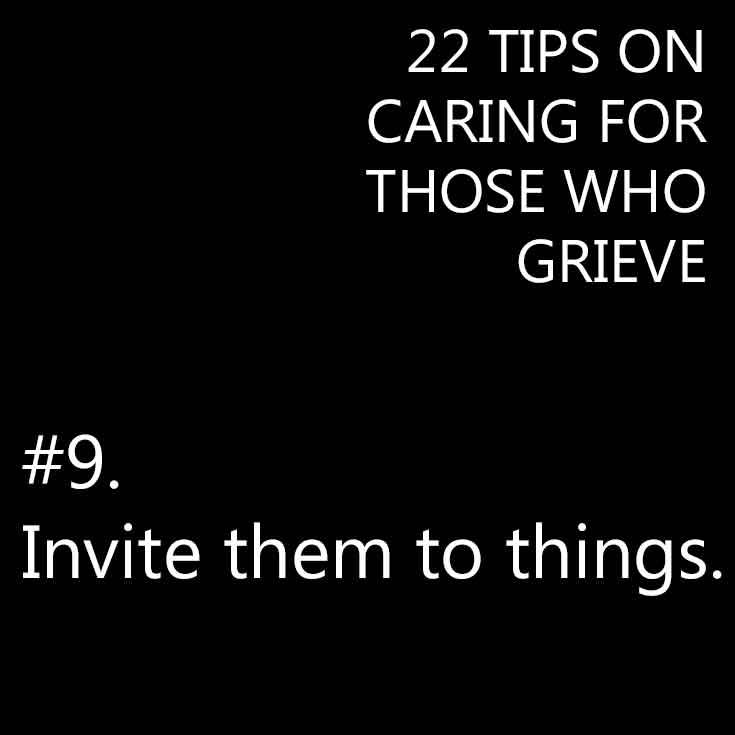
10. Text.
Text an encouraging note every once in a while – “Thinking of you,” “Praying for you,” “I’m here if you need anything.”
Don’t ask for or demand a response, and don’t worry if they don’t respond. Be sure that you don’t overwhelm them with texts, once a day or once every couple days is good.
What to do: Read through these tips on texting someone who is grieving.
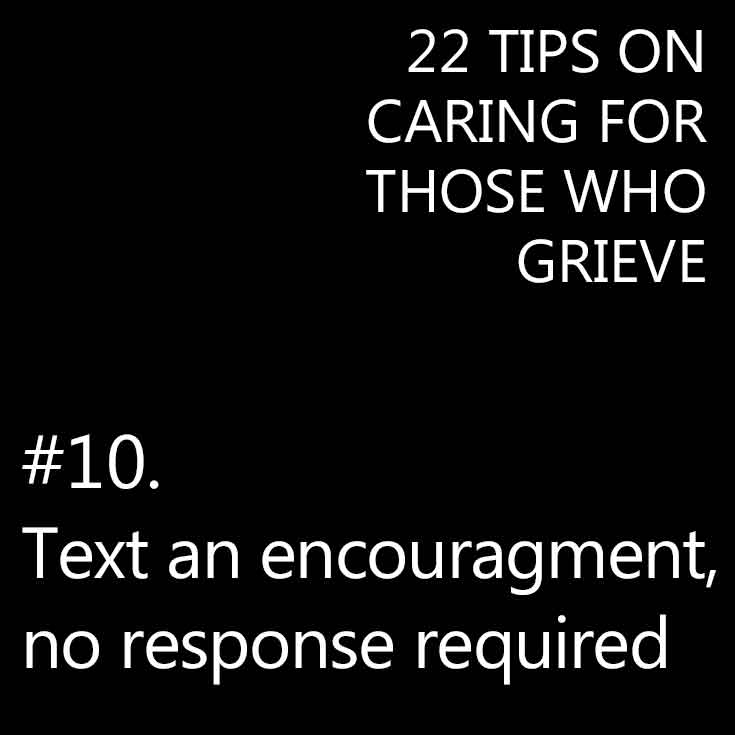
11. Don’t ask “how are you?”
Just don’t ask.
They’ll feel like a downer if they tell you the truth, and they’ll feel bad lying and saying they’re ok.
What to do: Instead, here are some things you can and should say.
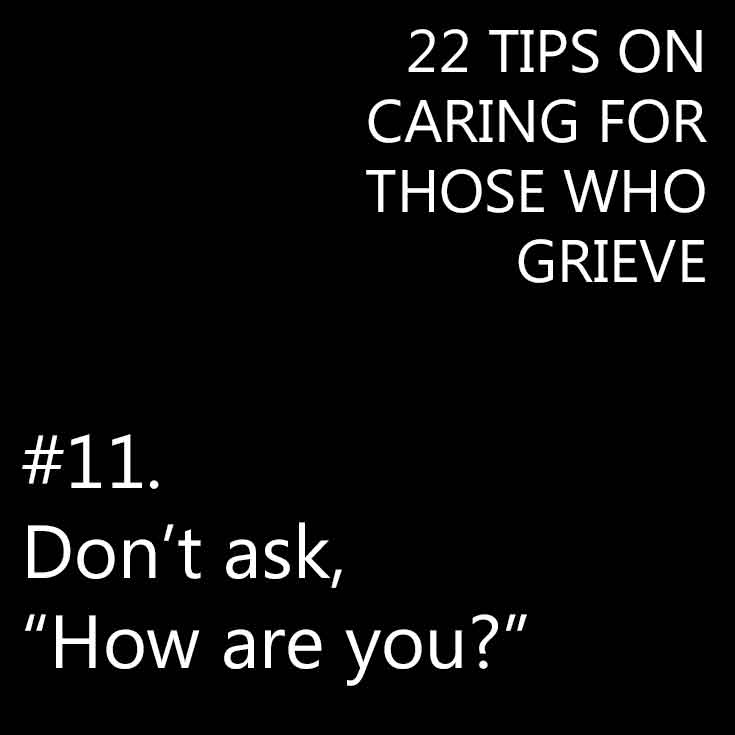
12. Give gift cards.
Giving cash might feel like charity, but a well-selected gift card will go a long way in showing that someone cares.
If they’re into music, give an iTunes card or a subscription to Spotify. If they have a favorite dinner place that delivers, get enough for a good meal or two plus tip. Coffee, favorite clothing store, bookstore, art supplies, etc.
What to do: Get a gift card and send it to them (or drop it off) in a sympathy card.
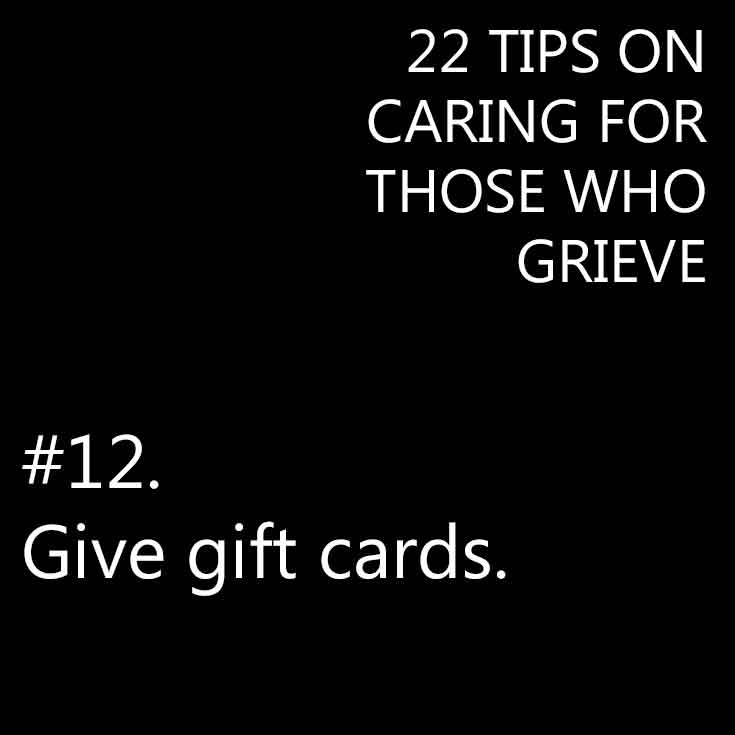
13. Tell them when you see their efforts.
Someone who is grieving the loss of a loved one will often feel like they have zero energy and zero motivation.
Even if it’s something as basic as getting showered and dressed that day, let them know that you see their efforts, that they are doing a great job, and that they are appreciated.
What to do: Watch out for ways that you can affirm them. Congratulate them for simple, “normal” things (but not in a patronizing way). “I’m so proud of you for coming to church today. I can’t imagine how hard that must have been! You looked great, BTW.”
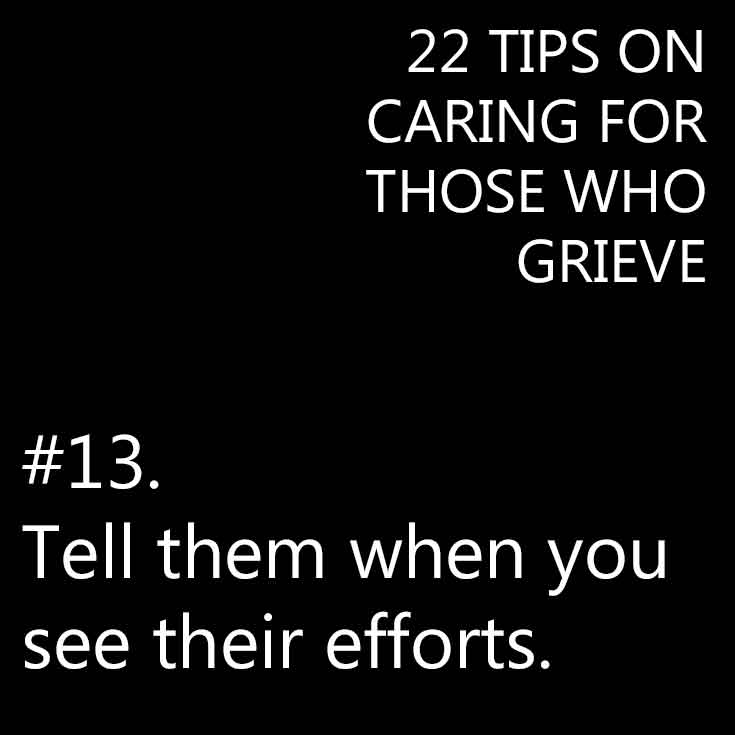
14. Don’t say some things.
It’s so tempting to try to say something comforting, like quoting the Bible verses mentioned above or any of the one-liners below. Don’t.
Don’t say:
- “They’re in a better place.”
- “It will get easier.”
- “I know how you feel.”
- “At least you have other children.”
- “You can always have more children.”
- “You can always remarry.”
- “Everything happens for a reason.”
- “At least they lived a long life.”
- “God never gives us more that we can handle.”
- “Don’t cry.”
- “Don’t feel bad.”
- “It could be worse.”
Adapted from this helpful post, which explains why you shouldn’t say each of those statements to someone who is grieving.
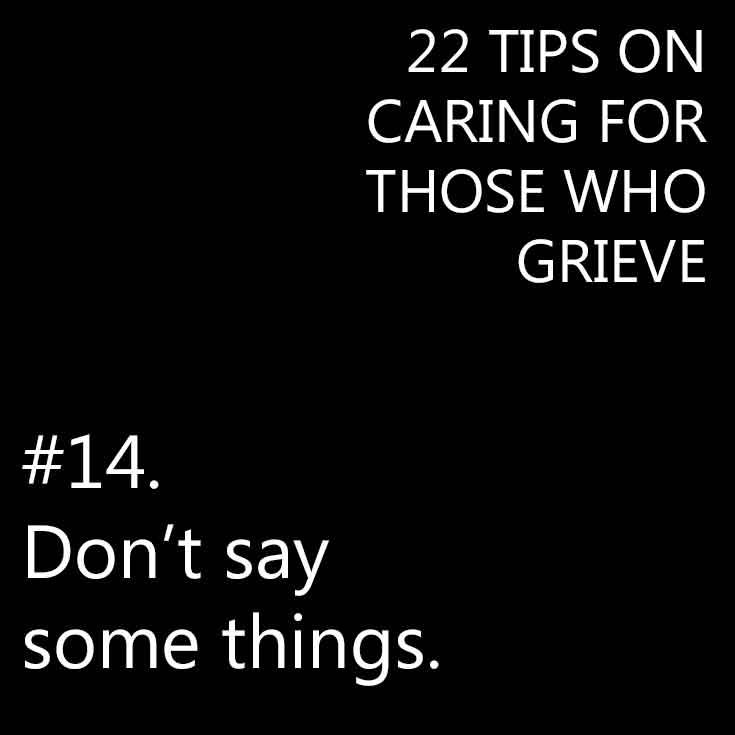
15. Don’t compare grief.
See above – you may be tempted to say “I know how you feel,” or maybe share a story of another person’s suffering and loss.
But don’t do it. Each person experiences and works through grief differently, so comparing grief stories won’t help them.
Instead, it usually tends to isolate them, since their immediate, internal response is almost always, “But you don’t know my grief.”
What to do: Think about your own stories of grief, and consciously remind yourself not to talk about them.
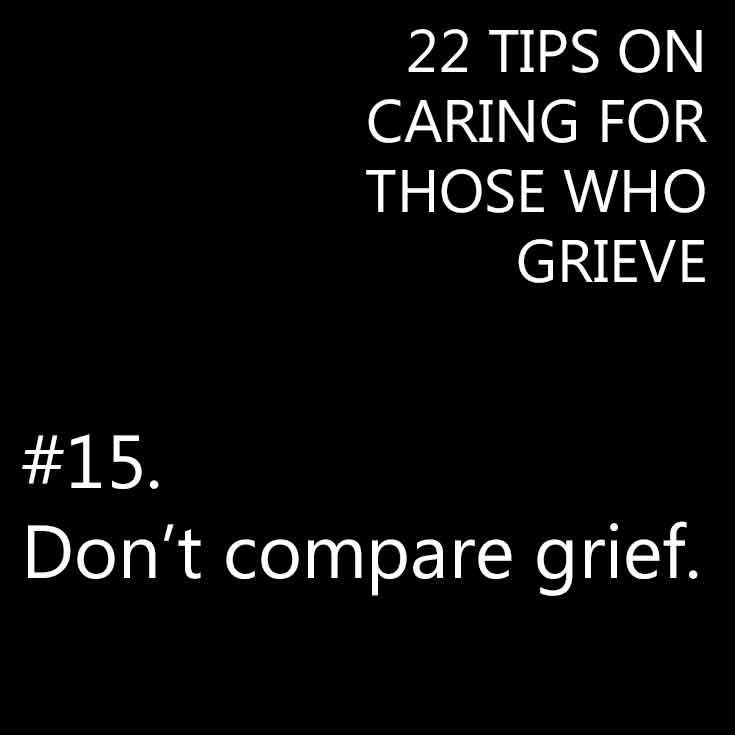
16. Run interference for them.
You may care enough to think through what you say, how and when you say it, giving space, being silent, etc. But most people have friends or relatives who just don’t seem to have that ability to empathize, and, though well-intentioned, will be prone to say things like “You can always remarry!”
One great way to help someone who is grieving is by running interference for them with these types of people.
- If church members are bringing a meal, be there to answer the door while your friend stays in their room “napping.”
- At the funeral, pull aside that one cousin who loves to talk and listen to all their stories about the lost love one so that your friend doesn’t have to (side note: this may be a way to help the cousin express their grief).
- Find out if your friend cares about memorial service reception details and make those decisions for them.
- Listen to the person who won’t stop comparing your friend’s loss with their own.
Taking on these small inconveniences will spare your friend in mourning from much greater pain.
What to do: Maybe the best way to do this is to just ask your friend, “Who do you want to avoid? I’ll help head them off and send them away for you.”
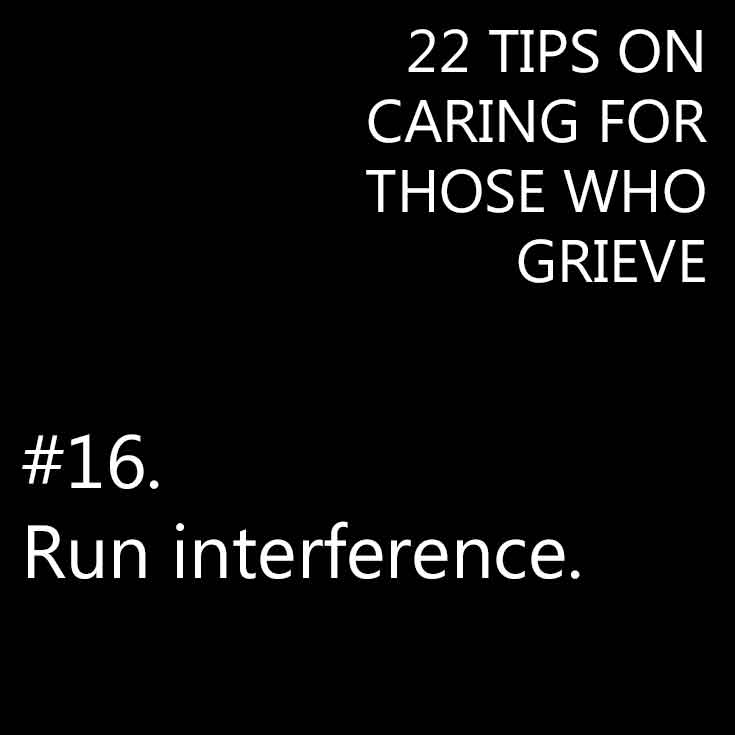
17. Do the “thank you” notes for them.
If there are “thank you” notes to be written for funeral attendees, gifts, helpers, or meal deliveries, offer to take this task for them. They have enough on their mind.
What to do: Bring a notebook or create a Google Doc and list out all the gifts and cards, who they are from, their return address, etc. You could even type out messages for your friend to sign. Address and stamp the envelopes.
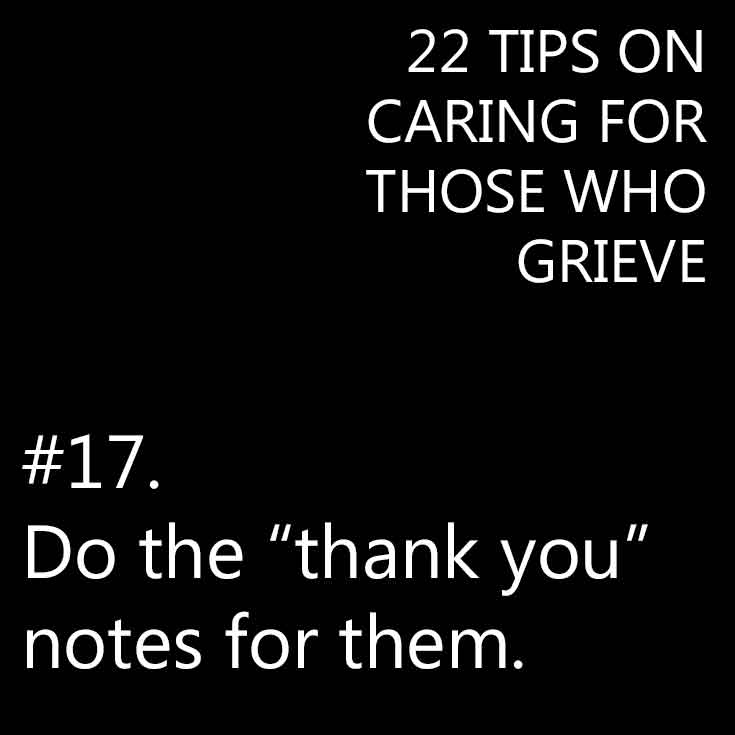
18. Use touch wisely.
Some people appreciate touch as their “love language.” Learn to recognize this (or simply ask), and offer a hug or a hand on their shoulder in appropriate circumstances.
Other people may feel overwhelmed when touched, so be sure to follow your intuition and if in doubt, just ask.
What to do: Literally ask your friend, “Do you want a hug right now? And in general, do you like it when people show physical affection, or would you prefer to avoid it?” This will also help you do tip #16, running interference for them.
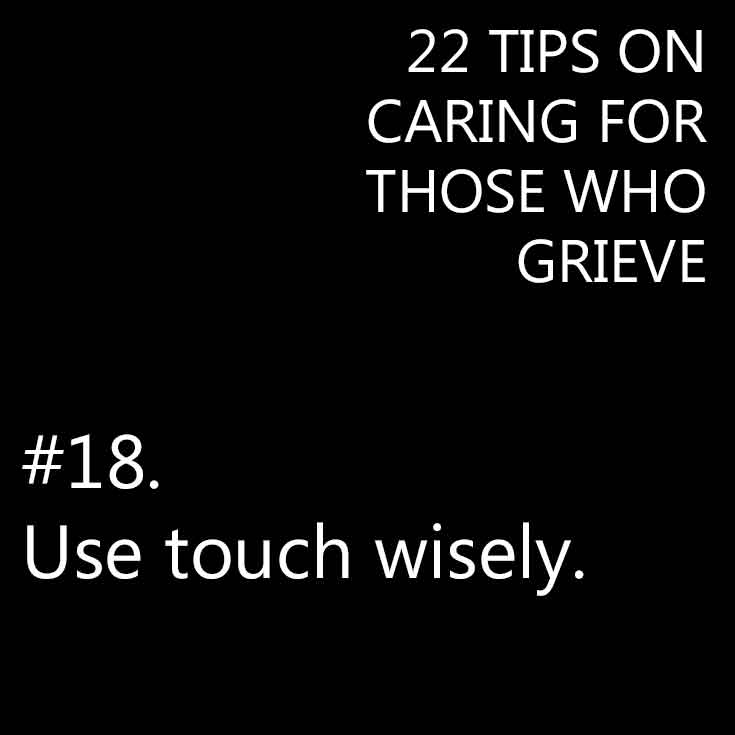
19. Share your expertise.
If you’re a lawyer, insurance agent, funeral professional, therapist, doctor, chef, contractor, handyman, plumber, electrician – just about any professional service might be of use to the bereaved.
Offer your services to help them with specific tasks or issues.
What to do: By text or in person, tell your grieving friend about your area of expertise and offer specific help.
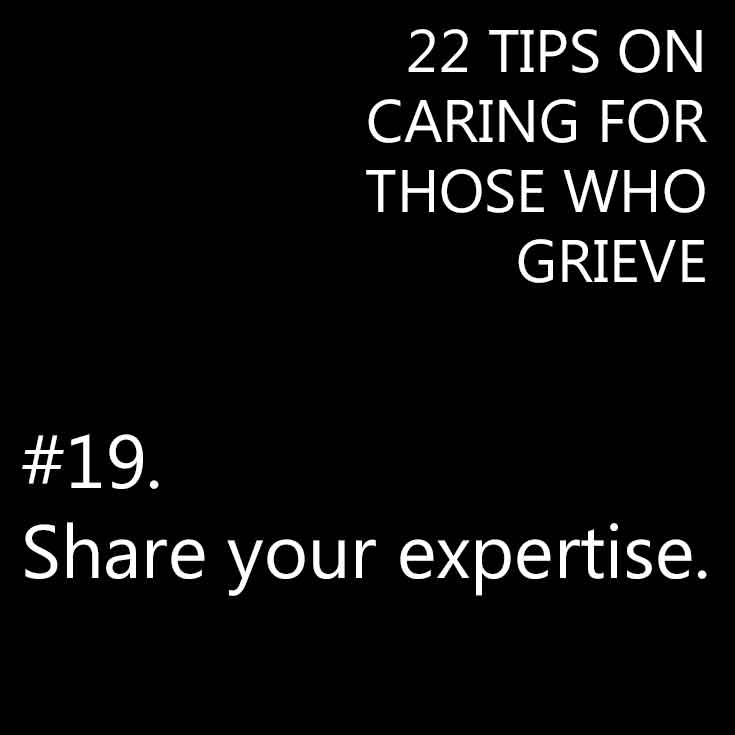
20. Create a memorial website.
A memorial website is a great place for friends and family to express their grief and also encourage the grieving loved ones left behind.
There are many free, easy to use websites available for creating a memorial site that can include funeral and memorial service information, blogging capabilities, and a wall for people to share memories.
What to do: See our guide to the best free memorial websites here.
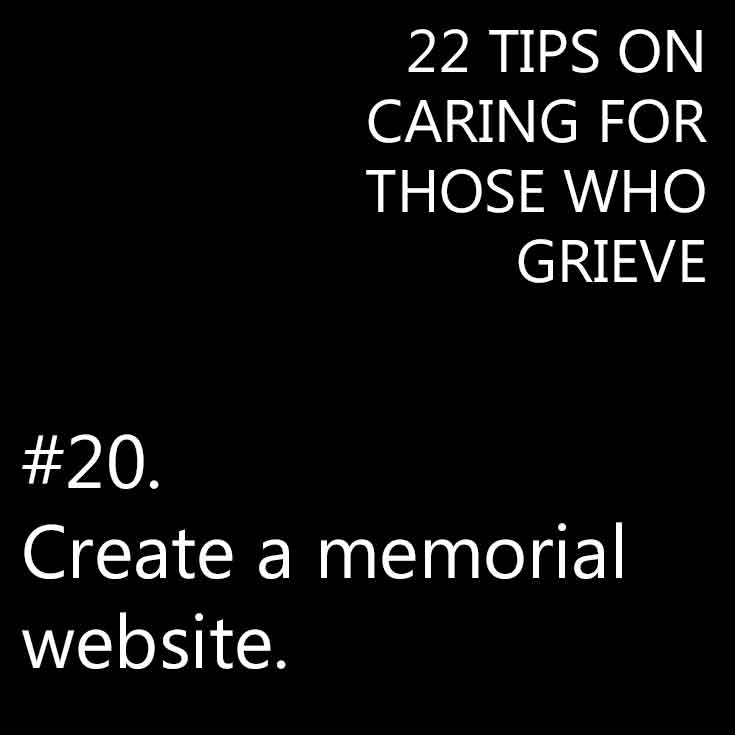
21. Watch out for warning signs.
Generally symptoms of grief such as depression, feeling overwhelmed, acting withdrawn, etc tend to fade and lessen over time. If you notice any of these warning signs, get help immediately.
HT: HelpGuide.org
- Difficulty functioning in daily life
- Extreme focus on the death
- Excessive bitterness, anger, or guilt
- Neglecting personal hygiene
- Alcohol or drug abuse
- Inability to enjoy life
- Hallucinations
- Withdrawing from others
- Constant feelings of hopelessness
- Talking about dying or suicide
What to do: Don’t mess around with serious issues like these. Get professional help immediately.
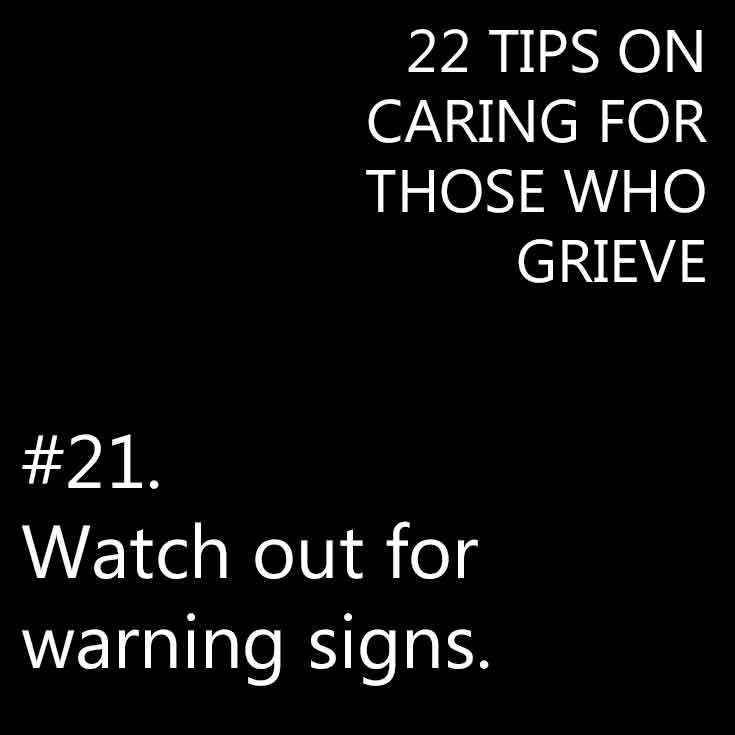
22. Remember that this is not about you.
Caring for someone who is grieving is not about you – it’s about them.
Keep this in mind and it will help you figure if, how, and when to apply these tips in a way that is truly loving and helpful.
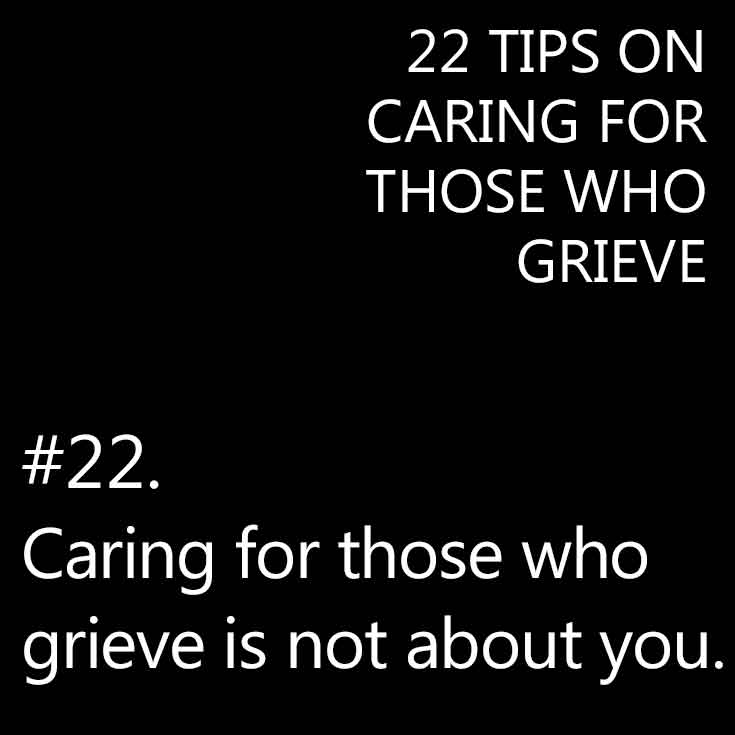
More Tips on How to Help Someone Who Is Grieving
- Create a memory jar filled with written stories and memories of their loved one.
- Go with them to the funeral home when planning the funeral – as someone who is a little more distanced the from decedent, you can help them save money and avoid emotional decisions.
- Say their loved one’s name. While it might feel like you should avoid talking about them, what the grieving person (often) wants more than anything is to know and feel that even though the person is gone, they are not erased from existence. Talking about the person who has died will often actually help the grieving person a lot.
- Don’t ask about the details of how the person died. Instead, when appropriate, ask about the person’s life – what was their favorite meal? What were their quirks, how did they take their coffee? These things help honor the decedent’s memory while affirming the mourner’s grief.
- Offer to help them find a grief support group, and even go with them as their support person if they need it.
- Text often. Keep in contact. Even saying little things like “thinking of you” or even “thinking of [decedent’s name] right now and just wanted to say I love you” can go a long way.
- Plan for emergency support. Be ready to drop everything in a moment if things get really bad for your friend. Maybe get a group of friends together so that at least one of you should be able to get free at any given time.
Read Next: 83 Practical Ways to Offer Comfort
Daniel has been working in the funeral industry since 2010, speaking directly to grieving families as they made funeral arrangements.
He began researching and publishing funeral articles on this website as part of his role as product and marketing manager at Urns Northwest.
Having written hundreds of articles and growing the site to multiple millions of views per year, Daniel continues to write while providing editorial oversight for US Urns Online’s content team.

Excellent advice. I especially liked the “what not to say” section. After I had a miscarriage of my first baby, I heard some of the most painful things from people trying to help. The worst was, “At least now you know you can get pregnant.” All I could think was, “I don’t want other babies. I want my baby that I just lost! How dare you!!” It took a long time to forgive this person, especially after my second miscarriage. And because of the comments, only immediate family even knew we were pregnant the second time.
Thank you for sharing, Emily!
A close friend just lost his wife of 31 years. He is really grieving but inwardly. He acts like he has it all together around others, but breaks down, gets angry, frustrated, etc. when he talks to me. I want to be there, but he has said some pretty hurtful things to me since she died. I like how you reminded me that these things may happen, and to keep in mind, “it’s not about you but your grieving friend.” He has always been a strong man, but this is tearing him apart. He has a 5 year old, and he hasn’t spent any quality time with him since his mother passed. I think this is the time for jim to really bond with his son. Yet, he comments that the child needs so much help. I can feel he’s saying that because I’m a female and I did tell his wife that if she were to die, I’d be there to help her husband and help take care of their son. But I feel he does not want to take on his role/responsibility as a parent. His wife was the more active parent (It’s been a little over two weeks since his wife pass).He commented how the child needs his mother. But I replied, “The next best thing to his mom is his dad.” No response. What do you guys think? I want to help, but I don’t want to take on that responsibility, nor do I want to be weighted down for too much longer by emotions that are not my own.
Hi Maria,
So sorry to hear about this situation! It’s never easy. I think your response sounds very healthy. You’re ready to help, but also recognize that the father needs to step up and engage as well. You shouldn’t need to take on the weight and responsibility of caring for someone else’s child when they are not doing it themselves. It’s one thing to be there to help out, but it’s not your responsibility to take over. It sounds like you’re doing your best, I think just stay the course and continue to give the father time to grieve.